Premium Only Content

Documentary: OLDEST RELIGIONS: The Entire History of Ancient Religions. Reaching Back 300,000 Years
Documentary: OLDEST RELIGIONS: The Entire History of Ancient Religions. Reaching Back 300,000 Years
-
511,413 views June 20, 2023
Gnostic Informant TV
-
Contents:
00:00:00 - Intro
00:03:14 - Stone Age Religion
00:16:52 - Proto-Indo European Religion 00:55:29 - Sumerian Religion
01:26:00 - Pelasgian Religion
01:46:45 - Oldest Genesis Version
02:18:16 - Dervani Papyrus
02:49:54 - Esoteric Roots of Judaism
03:28:25 - Heliopolis Egyptian Mysteries 03:35:27 - Acts of Isis & Osiris
04:47:00 - Egyptian Book of the Dead
04:56:29 - Serapis Mysteries
05:34:52 - Orgiastic Rites of Eleusis
06:02:07 - Ancient Magic
06:12:00 - Ancient Divination
06:21:38 - Ancient Mysticism
06:38:03 - Mysteries of Athena
07:01:55 - Game of Thrones in Antiquity 07:42:53 - Roman Religion
08:21:39 - Elagabalus & Sol Invictus
09:11:00 - Julian the Apostate (Neo-Platonism) 09:27:41 - Hypsistarians (Monotheism) 09:45:59 - Orphism
09:57:09 - Phrygian Influence on Christianity 10:28:23 - How Satan became Lucifer
11:10:55 - Mysteries of Eros
11:33:50 - Outro
-
FAIR USE FOR EDUCATIONAL PURPOSES
-
Mirrored From:
https://www.youtube.com/@GnosticInformantTV
-
We break down the most ancient forms of nature worship, to Paganism, down to the Syncretic Roman Imperial Cult and Judeo-Christian and Islamic Monotheistic Religions. Ancient religions have been a part of human history since the Stone Age. These religions were often based on animism, the belief that everything in nature has a spirit or soul. As humans evolved, so did their religious beliefs. The ancient Egyptians believed in a pantheon of gods and goddesses who controlled the forces of nature and the afterlife. Proto-Indo-European pantheons were the earliest recorded religious beliefs of the Indo-European peoples. These pantheons were polytheistic, meaning they believed in multiple gods and goddesses, and often had a focus on nature and the elements. Moving forward in time, we can look at the ancient Greek and Roman religions, which were heavily influenced by the earlier Indo-European beliefs. The Greeks had a pantheon of gods and goddesses, with Zeus as the king of the gods and a focus on mythology and storytelling. The Romans, on the other hand, had a more practical approach to religion, with a focus on rituals and ceremonies to appease the gods. The Etruscan religion was the religious belief system of the Etruscan civilization, which was located in central Italy from the 8th to the 3rd century BCE. The Etruscans believed in a pantheon of gods and goddesses, and their religion was heavily influenced by the Greeks. They also believed in the concept of divination, and used various methods such as reading the entrails of animals to predict the future. The Etruscan religion played an important role in the development of Roman religion, as many of the Roman gods and goddesses were based on Etruscan deities. However, much of the Etruscan religion has been lost to history, as many of their religious texts and artifacts were destroyed over time. During the Augustan age, the Roman religion underwent significant changes, with the emperor Augustus promoting a more traditional and conservative approach to religion. This included a focus on the worship of the state gods, as well as the deification of the emperor himself. In ancient Greece, religion was intertwined with daily life and politics. The Greeks believed in a pantheon of gods and goddesses who controlled different aspects of life. The Romans adopted many of the Greek gods and goddesses, but also had their own deities. Judaism originated in the Middle East around 2000 BCE and evolved over time, with the Hebrew Bible serving as a central text. Early Judaism was characterized by a strong emphasis on monotheism, the belief in one God, and the importance of following God's laws and commandments. The Jewish people also placed great importance on the concept of covenant, or the special relationship between God and the Jewish people. As Christianity emerged in the Middle East, it spread rapidly throughout the Roman Empire. Christianity was based on the teachings of Jesus Christ, who preached love, forgiveness, and salvation. The religion became the dominant faith in Europe during the Middle Ages. Islam emerged in the 7th century in the Arabian Peninsula. The religion was founded by the prophet Muhammad, who received revelations from Allah. Islam spread rapidly throughout the Middle East and North Africa, and eventually reached Europe and Asia. Today, Christianity and Islam are the two largest religions in the world. Christianity has over 2 billion followers, while Islam has over 1.5 billion. Both religions have had a profound impact on human history and continue to shape the world today. In conclusion, ancient religions have played a significant role in human history. From animism to modern Christianity and Islam, religion has shaped the way humans view the world and interact with each other. While the specific beliefs and practices of these religions may differ, they all share a common goal of providing meaning and purpose to human life.
-
 57:22
57:22
barstoolsports
9 hours agoHardest Puzzle Breaks Brains | Surviving Barstool S4 Ep. 8
137K4 -
 9:02:15
9:02:15
Dr Disrespect
13 hours ago🔴LIVE - DR DISRESPECT - MARVEL RIVALS - RANKED
302K52 -
 1:00:46
1:00:46
The StoneZONE with Roger Stone
4 hours agoFake News Attack on Tulsi Gabbard! | The StoneZONE w/ Roger Stone
29.6K9 -
 2:24:08
2:24:08
WeAreChange
7 hours agoElon Musk & Donald Trump: The Emergency Halt That Saved Us
57.7K47 -
 1:13:11
1:13:11
Flyover Conservatives
23 hours agoWARNING! Is Bitcoin CIA-Controlled? – The Shocking Reality of Digital Assets - Clay Clark | FOC Show
18.9K4 -
 2:00:37
2:00:37
Space Ice
10 hours agoSpace Ice & Redeye Try To Figure Out Seagal's Most Incoherent Movie
57K2 -
 1:00:36
1:00:36
PMG
1 day ago $5.76 earned"Santa Trump is Giving Us Hope - But Will Johnson Stand Strong?"
59.1K10 -
 54:30
54:30
LFA TV
1 day agoThe German Strongman’s Arrival Is Imminent | Trumpet Daily 12.18.24 7PM EST
48.5K3 -
 2:04:11
2:04:11
Melonie Mac
8 hours agoGo Boom Live Ep 32! Soul Reaver Remastered!
40K9 -
 39:11
39:11
Sarah Westall
5 hours agoDigital Slavery and Playing with Fire: Money, Banking, and the Federal Reserve w/ Tom DiLorenzo
50.3K4